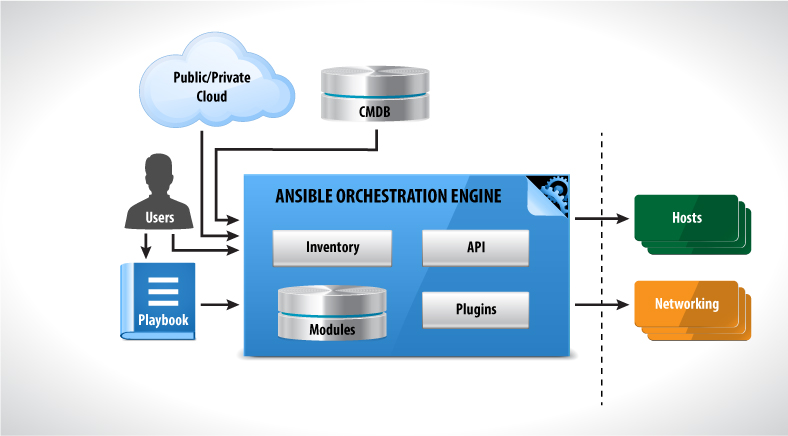Ansible
Presenter Notes
Whoami
- Haïkel Guémar (@hguemar)
- Senior Software Engineer (marque blanche)
- Développeur Fedora depuis 2006
- Membre de l'APRIL, Openstack FR etc.
- Trolleur patenté

Presenter Notes
Ansible: supra-luminic IT automation

Presenter Notes
Différents Niveaux de la gestion de configurations
- shell distant: ssh, pssh, func
- Orchestration: Fabric, Capistrano
- gestion de configuration: CFEngine, Puppet, Chef
Presenter Notes
Installer Ansible
# yum install ansible
# apt-get install ansible
# pip install ansible
Très peu de dépendances:
- contrôleur: python, paramiko, PyYAML, jinja2, httplib2
- minions: python 2.5+
Presenter Notes
concepts
Presenter Notes
Inventaire d'hôtes
# /etc/ansible/hosts
ldap.example.com
[webapps]
web[0:8].example.com
[database]
db-[a:c].example.com ansible_ssh_user=postgres
[prod]
web
database
Presenter Notes
modules
- gestion de paquets (apt, yum, pkgin, pacman, macports)
- cloud (AWS, openstack, GCE)
- base de données (mysql, postgresql, mongodb)
- serveurs (apache, nagios, rabbitmq)
- virtualisation (kvm, xen, docker, vagrant)
- système: utilisateurs, groupes, fichiers, quotas, cron etc.
- les votres !
Presenter Notes
modules en action
$ ansible all -m ping
$ ansible prod -m yum -a name=\* state=latest
$ ansible !db -m yum -a name=\* state=latest
Presenter Notes
Pas d'agent !

Presenter Notes
Une exception: mode accéléré
# requiert python 2.5+, python-keyczar
- hosts: web
accelerate: true
# accelerate_port: 5099
Presenter Notes
Playbook

Presenter Notes
Playbook
- name: check/create webservers
hosts: webservers
user: root
tasks:
- name: install httpd
action: yum state=installed name=$item
with_items:
- httpd
- mod_wsgi
- postgresql-server
- name:
service: name=httpd enabled=yes state=started
Presenter Notes
Playbook
$ ansible-playbook check.yml
Presenter Notes
Playbook
- variables
- templates
- roles
- handlers
- includes
- ansible-pull
Presenter Notes
Récapitulatif
Presenter Notes
Architecture

Presenter Notes
Donc ...
- installer Ansible
- créer son inventaire
- installer l'agent // IT'S A TRAP !
- automatiser
Presenter Notes
Cloud Ready !

Presenter Notes
Plus d'infos
docs.ansible.com
galaxy.ansible.com
Presenter Notes
One More thing: Ansible RDO playbooks
https://github.com/ansible/ansible-redhat-openstack
$ ansible-playbook -i hosts site.yml
$ ansible-playbook -i hosts playbooks/image.yml -e "image_name=cirros image_url=https://launchpad.net/cirros/trunk/0.3.0/+download/cirros-0.3.0-x86_64-disk.img"
Presenter Notes
I did it again !
CentOS dojo à Lyon le 11 avril @Epitech

Plus d'informations sur le wiki CentOS: http://wiki.centos.org/Events/Dojo/Lyon2014